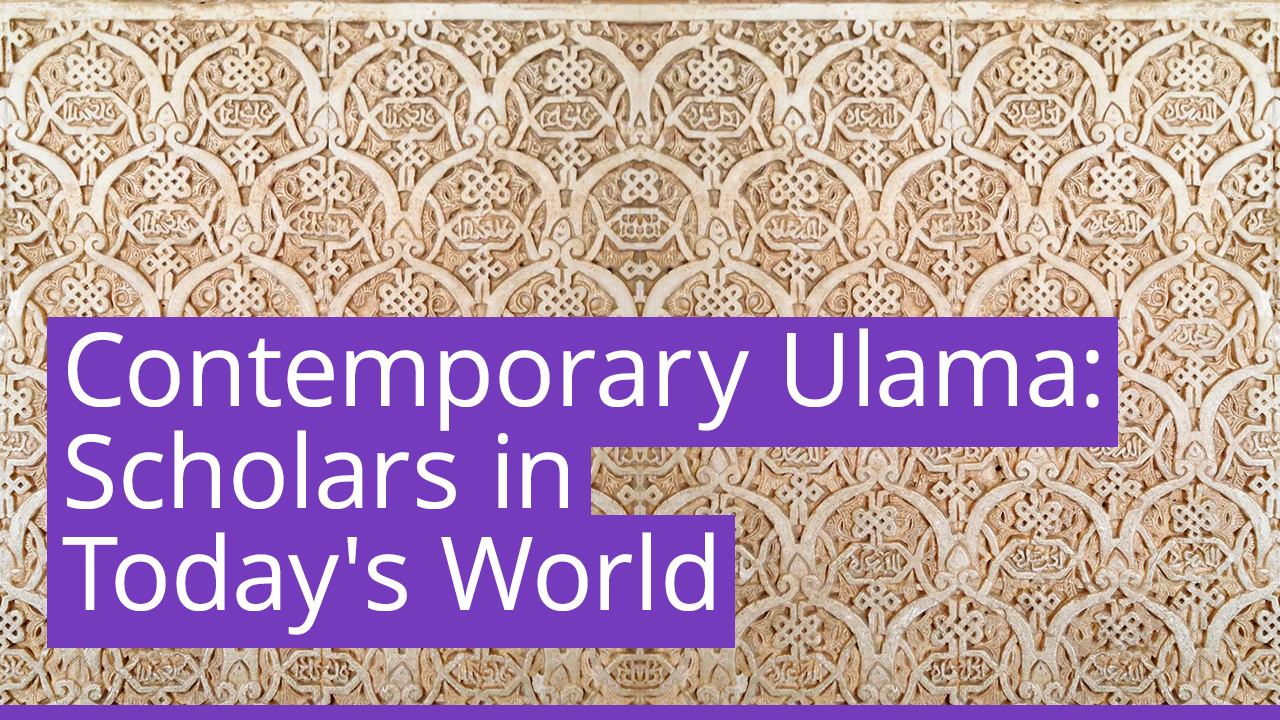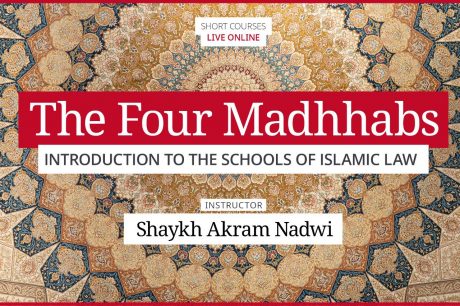Contemporary Ulama: Scholars in Today’s World
Course Overview
This seminar will address some of the unanswered questions surrounding the ‘ulama today. These include questions such as: who are the ‘ulama, what role do they play in contemporary society and what areas of concern do they face? With more and more Muslims studying their religion, beginning at various points in their lives, so many potential sources of knowledge ranging from books to the internet, and the great Islamic intellectual heritage that precedes us, where do we stand today with regards to our scholars? This course will explore their qualifications, roles, rights, responsibilities, and challenges with Shaykh Akram Nadwi, a long-standing member of both the international community of ‘ulama, as well as the ‘ulama in the UK.





Review of: Contemporary Ulama (by Asim Mehmood)
Introduction
Contemporary Ulama: Scholars in Today’s World is designed to reform the way we perceive scholars of our time and how they should be in light of Quran, Sunnah and History.
In the Shaykh’s introductory session he scattered over a few points to illustrate the variety of issues Ulama of today face in the West. Firstly, ‘Ulama are marginalised and have no role in contemporary society. We know society needs engineers, doctors, economists and entrepreneurs but where do the Ulama fit in exactly? While Ulama are used – in what capacity are we utilising them? Do you need to be an Aalim to conduct a marriage? Or lead the prayers? In reality, Ulama are not seen for their true worth. A befitting introduction to what followed throughout the day indeed. The following sessions proceed to address some of the underlying problems that the scholars are facing.
Ulama and Employment: A Hidden Contradiction
To put it simply: ‘Ulama are humiliated if they are employed.’ A unique take-away from the entire seminar was this point. In a capitalist society, employment is one of the four macroeconomic objectives and an incredibly important metric too. Oftentimes, States are compared to one another by their employment rate. While it is important to note that employment is a term that incorporates those who are sole-traders and entrepreneurs, it is not to be conflated with Shaykh Akram Nadwi’s use of the term. Rather, Shaykh Akram provided two alternative avenues for scholars other than being in ‘traditional employment’. These are:
1. Self-employment (owning a Business or Service)
2. Receiving financial support from the community
The ramifications of the scholarly people adopting traditional employment is that they are reduced to following orders of a person that may contradict their values. Scholars who often take positions to follow others make them susceptible to error and mistreatment. As Shaykh Akram comments, ‘If you study to become employed, then how will you become leaders?’ Scholars are dignified intrinsically for their noble pursuit, yet to be in employment can hinder the growth of a scholar and take him away from the incredible investment he or she had made towards becoming one.
Ulama and Economics: Law of Demand and Supply
To understand the need of ‘Ulama, one need not look further than the law of Demand and Supply. There are a few factors mentioned which can be incorporated to better understand the situation.
The supply of ‘Ulama’ is beyond the optimum requirement. There is an excess of scholars which automatically causes their value to drop. The valuation deduced by the supply curve is high as there is a direct relationship between quantity and price. The higher the quantity, the higher the price. However the law of demand from the people stipulates an inverse relationship between quantity demanded and the value of the scholars. If scholars are in excess, it leads to a fall in their estimation from the people.
Shaykh Akram comments: ‘Many Ulama complain that in this society, doctors and engineers get paid better and we Ulama don’t get anything. It will remain like that .The truth is that doctors and engineers are more beneficial[…] people need doctors every day. Certainly they will get more payment.’
A plethora of reasons were given that add depth to the argument that Ulama are not valued in society. First and foremost, scholars who are of high calibre must distance themselves from traditional employment. That is, working in an organisation and serving the values and interest of the organisation. They must seek to be independent from the biases of organisations so they can uphold Islamic values to the highest standard. Another solution is for Ulama to distance themselves from the expectation of society to do the jobs that they are overqualified for: otherwise known as underemployment. Conducting Nikah, being an Imam for prayer, and official moon-sighting are but a few of the examples that Ulama need not necessarily do. If they were to devote their life to teaching, researching, and long-term study, then they will increase the standard of what is required to be a scholar, which will in turn reduce the supply.
Ulama and Society: The Evident Disconnect
Ulama play a part in reforming society for the better. However, they are misused for trivial activities that undervalue the skills they have attained through the rigorous study of the Islamic Sciences. There is an evident disconnect between the ‘alim and the true needs of the people that only an ‘alim can help in. One of the forms of disconnect is through the use of language. Ulama living in the west are in need of using the correct language to answer the issues of their people that helps achieve the intended outcome. For example,consider smoking. Shaykh Akram remarked that a smoking advert showcasing the harms of smoking does better in conveying the reasons to abstain from it than a scholar. Rather, the scholar trained knowing the issues of the people should, in theory, be best to address their issues to get the intended outcome of either commanding or forbidding an action.
Certainly, a disconnect between scholars and society can be the cause of division and discord. Scholars of the past would live amongst the people: Imam al-Shafi’i as a tanner, Imam Ahmad would engage in hard labour during his travels to fund his journey to visit scholars. Scholars were adept with knowing their people and how their religious needs may be filled. However, a far deeper issue than all of this is how scholars are disconnected from the sources of this religion.
Ulama and The Sources: The Evident Disconnect pt. 2
To the detriment of the community, scholars today are better connected with the opinions of other scholars with regards to fiqh, aqidah and other sciences than they are with the words of Allah and the application of the words of Allah (sunnah). Scholars have drifted from the Qur’an and the approach scholars have with the Quran lacks depth. ‘If you come to the Qur’an thirsty, it will give you [the answers]’.
The Qur’an is primarily a book of guidance. It is comprehensive, full of lessons and insights that are attributed to perfection. Allah preserves this book and when you are reading it, you are in fact reading the words of Allah. There is no book that can compare to it, yet its misuse has led to scholars dividing amongst themselves as well as disconnecting from society. Scholars that are in tune to the Quran, reading it daily with contemplation and deep veneration are inclined to the natural way. This is to be with one’s fitrah and thus an alignment between the inward and outward realities makes a scholar fit to help the people that he is responsible for.
With regards to the Sunnah, it sets an example for mankind for eternity. The Messenger (s) showed how to approach and apply the rulings, meanings and advice from the Quran in a holistic manner. The Sunnah shows the true parameters of the legal rulings found in the Quran and shows the practical implementation of Allah’s book. Thus, part of the problem of disconnect stems from scholars misusing the Sunnah as a form of guidance. Many scholars are comfortable using books written on rulings of Fiqh but if they, who hold the skills to deduce rulings, do not use the primary sources as their first reference point, society at large will lose touch of the importance of it too.
Thus it can be said, Ulama must have an intimate connection to the sources of this religion if they are to help others follow the right way.
Ulama and Nature: An Inward Light
The fitrah is our natural inward form that God had created within us. It incorporates the cleanliness of the heart, the fine tuning of the mind and the organising of thought. It is these three qualities that fuse together to allow scholars to be in line with their nature.
‘Allah enables you. How? Firstly, he gave you a fitrah. This nature doesn’t have knowledge but it has istidaad, [which is] preparation for knowledge[…] Many people say that a person who gets a degree from a Madrassah he becomes an ‘alim… people think once you pass the final exam you become an ‘alim. This is not the proper meaning. It was not meant to be like that. Many of Ulama we know never even received a degree.’
Shaykh Akram Nadwi discusses that, today, to study is to become a Mufti or to be classified as an ‘alim. In truth, no completion of qualification is an indication of being an ‘alim. To be an ‘alim is a life-long pursuit of knowledge and, as the Shaykh mentions: ‘Knowledge is a response to the urge from the fitrah[…] There is no urge in the fitrah to become a mufti. The fitrah does not need that. The fitrah wants to worship Allah, to thank Him and acknowledge Him.’
Ulama and Lifestyle: Responsibility, Ihsaan and Asceticism
Finally, Ulama must aspire to the lifestyle of an ‘alim and follow the true way of the scholars of the past. Imam Abu Hanifah, for example, was a man of piety, prayer and contemplation. His lifestyle is what should be emulated. Ulama must be responsible and have high standards of asceticism. Praying, fasting and living with the Qur’an. People should look up to them for their spiritual vitality. This point comes at the end because mastering and rectifying the above points will inevitably lead to a lifestyle that is in line with the Qur’an, the way of the Prophet (s) and those who follow the way of the Prophet (s).